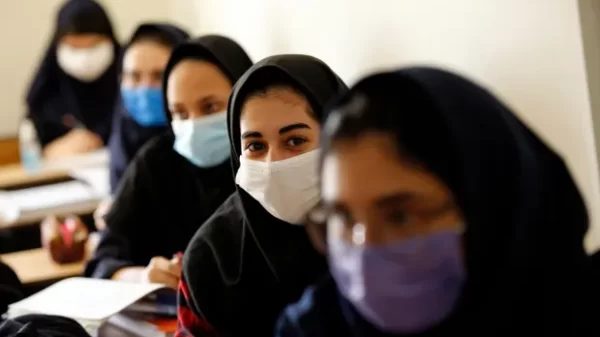“Does anyone ever say ‘You know you’ve done a f*cking good job because everyone else has sat on their arses and done nothing. No signs of that, no?” – Gillian Keegan after an interview for ITV News.
Those words were certainly conceited and unprofessional. Education Secretary Gillian Keegan’s off-camera comments regarding the recent revelation that 147 schools were built with unsafe reinforced autoclaved aerated concrete (RAAC), raise an important question about ministerial responsibility – who should be responsible for mistakes in government? By the nature of modern ministerial appointments, which have become something of a ‘revolving door’ in post-Brexit era politics, ministers are not expected to be fluent in their brief – much less in the specifics of 20th-century construction practices. Gillian Keegan will have served as Education Secretary for a year in October; given her fairly short tenure, is it really reasonable to consider her responsible for the structural problems in our school buildings?
Yes, it is. Individual ministerial responsibility, whereby a cabinet minister bears ultimate responsibility for all actions within their departmental remit, is one of the most important constitutional conventions in the British parliamentary system. The parliamentary briefing on individual ministerial responsibility cites the case of Sir Thomas Dugdale, Conservative Agriculture Minister, who resigned in 1954 after an enquiry into a fairly obscure case wherein civil servants in the Department of Agriculture refused to resell land back to its original owners after it had been compulsorily purchased by the Air Ministry in 1937. In his resignation speech to parliament, Sir Dugdale said that “it would be deplorable if there were to be any departure from the recognised constitutional position. I, as Minister, must accept full responsibility to Parliament for any mistakes and inefficiency of officials in my Department, just as, when my officials bring off any successes on my behalf, I take full credit for them.”
Sir Dugdale’s resignation showed honesty and integrity; two attributes from what would later be called the Nolan principles, particularly commendable given the fairly inconsequential nature of the scandal. In contrast, the RAAC scandal seems particularly worthy to see resignations at the highest level of government, given the often lethal consequences of building collapse, but as yet there have been no consequences for any ministers in the Department for Education.
As such, Keegan’s apparent dismissal of her responsibility for the RAAC scandal completely undermines the principles of individual ministerial responsibility. In a radio interview recorded the day after her comments on ITV News, Keegan told head teachers who had not yet responded to an RAAC survey to “get off their backsides”; thus appearing to lay some responsibility on school leaders themselves for dangerous RAAC. Daniel Kebede, general secretary of the National Education Union labelled it “outrageous” to lay any blame on schools for the RAAC scandal, criticising successive health ministers for failing “to show leadership on this issue for very many years”. The NEU was on strike earlier this year over pay and workload for its teaching staff. It was later revealed that many of the letters sent by the DfE demanding schools return an RAAC survey had been sent in error, highlighting the mismanagement of the crisis.
This failure of leadership permeates through the highest levels of government; Rishi Sunak has repeatedly lied and blamed others for high-profile government actions. For example, in an LBC phone-in in August, Prime Minister Rishi Sunak said, concerning the nurses’ pay strike that month, “they are striking and that is the reason that the waiting lists are going up”; contrary to a report by the Health Foundation, a significant health think tank, which found that the government created “the roots” of the problem which lies “in political failures to tackle rising pressures over the last decade”. Likewise, Sunak claims no responsibility for the RAAC scandal, despite a former top civil servant in the DfE claiming Sunak refused to fully fund repairs to crumbling schools with evidence of a “critical risk to life” during his time as chancellor. The Guardian reports that the DfE warned schools about the potential danger of RAAC for sudden collapse as early as December 2018, following the collapse of a ceiling in a school in Kent in July that year. Three prime ministers and six education ministers on; only now is action being taken to remove RAAC from schools and public buildings.
If ministers do not take responsibility for the actions of their civil servants, then they have little motivation to intervene in crises like this unless it becomes completely imperative. However, by the nature of the ‘revolving door’ system of ministerial appointments, ministers can easily defer taking action on difficult and expensive issues to their inevitable replacement. This sets a dangerous precedent for ministerial responsibility contributing to the culture of irresponsibility presiding over Westminster in the post-Brexit era.
Several weeks after the RAAC scandal first broke, the DfE added 27 to the list on 19 September, leading some of these schools to implement hybrid or remote teaching. In this period of perpetual uncertainty for education professionals, as well as pupils and parents, six unions including the NEU have sent an open letter to Keegan demanding answers to the key questions surrounding the crisis, particularly regarding deadlines for the removal of RAAC. The letter also questions how many more schools could be affected, but have not yet been investigated; perhaps the most urgent question as these school buildings currently pose a danger to pupils and staff. The minister is yet to respond to this letter.
Given the critical nature of the RAAC crisis, it is particularly important that the response is effective and communicated well. The communication surrounding the RAAC scandal has been woefully poor, resulting in a sense of alienation among school leaders. While surveys into the presence of RAAC in schools will hopefully conclude soon, we are yet to see when the effort to remove RAAC from affected schools will be completed. Most crucially, it remains uncertain when children in affected schools will return to fully in-person teaching. Upholding the principle of individual ministerial responsibility is key not only to ensuring an effective resolution to this crisis but also to the health of Westminster as a whole, for if the minister does not foot the blame for departmental problems then they have little motivation to take the tough decisions required for a solution.


















